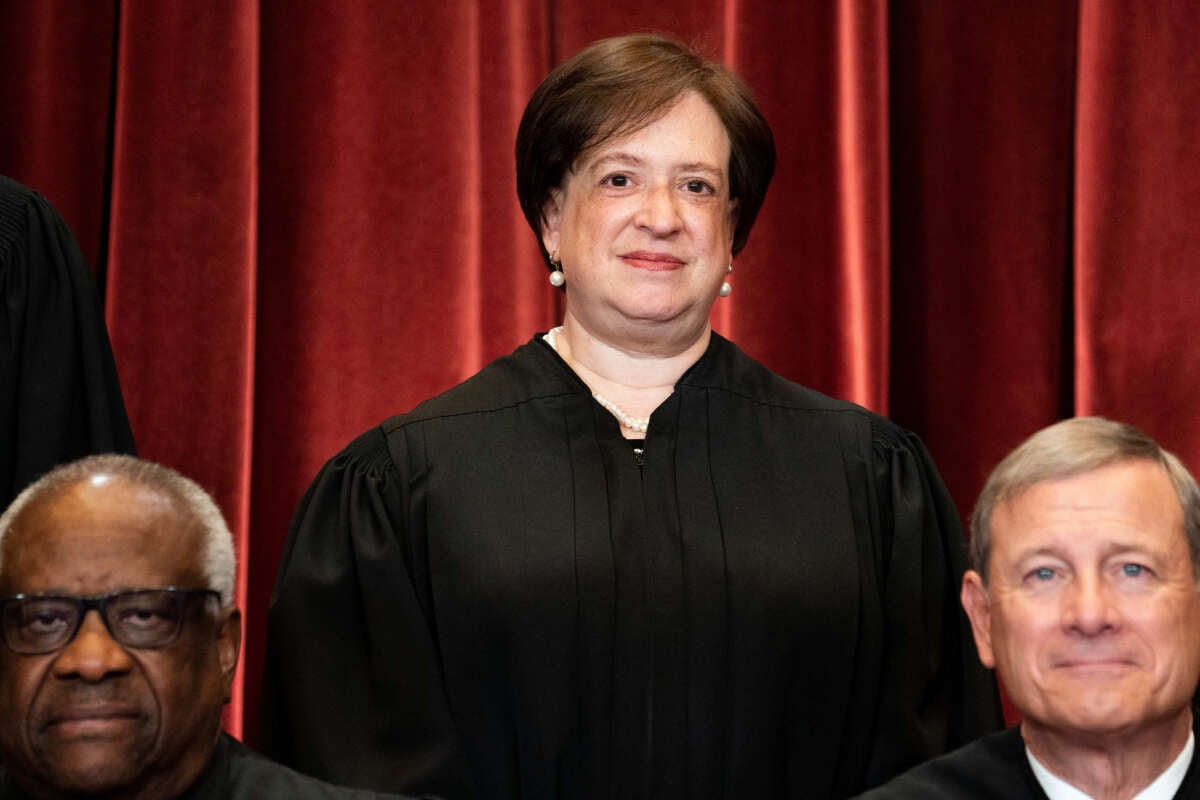For the second time in just over two months, Supreme Court Justice Elena Kagan made a public statement of support for creating an enforcement mechanism for the court’s recently created code of ethics.
The ethics code was implemented last year, and while the rules it stipulates for the justices have been acknowledged as a good starting place, ensuring that they are followed has been a challenge, as the code stipulates that the justices themselves decide whether they’re abiding by the code or not.
Speaking at the New York University School of Law on Monday, Kagan said that the high court should consider implementing an enforcement rule to increase trust in the judicial institution.
“It seems like a good idea in terms of ensuring that we comply with our own code of conduct going forward in the future. It seems like a good idea in terms of ensuring that people have confidence that we’re doing exactly that,” Kagan said.
Critics have suggested that creating a panel charged with enforcing the Supreme Court’s ethics rules would lead to an increase in unsubstantiated claims against justices, making enforcement of the code impossible. But Kagan dismissed those fears, noting that public complaints against the court are already numerous.
“I mean, there’s, like, lots of ability now to make unfounded charges about what justices do and don’t do. So I don’t really see how it would increase that,” she said.
Baseless claims against justices could also be weeded out by a separate panel of lower court judges, Kagan said, which could be selected by Chief Justice John Roberts for that purpose.
As NBC News reported, Kagan did not call for Congress to implement enforcement standards but rather said that the Supreme Court itself should take the initiative in doing so.
Kagan made headlines in late July when she endorsed the idea of an enforceable code of ethics for the Supreme Court, becoming the first justice to do so, during a judicial conference in Sacramento, California. Kagan suggested that an ethics panel composed of a “committee of highly respected judges with a great deal of experience and a reputation for fairness” could be assembled by Roberts in order to make sure justices were following the rules.
“Rules usually have enforcement mechanisms attached to them, and this one, this set of rules, does not. … However hard it is, we could and should try to figure out some mechanism for doing this,” Kagan said at the time.
Between then and now, another justice of the court has signaled support for an enforcement code with more teeth. During an NPR interview earlier this month, Justice Ketanji Brown Jackson, the newest member of the high court, implied that she, too, would back the idea of a panel enforcing the ethics rules, although not as forcefully as Kagan has.
Jackson questioned why ethics rules in lower federal courts could be enforced while at the Supreme Court they were self-enforced.
“I think the question is whether there’s something about the Supreme Court that would make it different than the binding ethics rules that exist in the lower courts,” Jackson said in the interview. “At least up to this point, I haven’t seen any good reason why there shouldn’t be binding rules. But so far, we’re not there.”
Ethics scandals have plagued the Supreme Court in recent years, particularly the court’s conservative bloc members. Justice Samuel Alito has been criticized for refusing to recuse himself from key cases involving former President Donald Trump and his allies, after it was reported that homes owned by Alito had pro-Trump and Christian nationalist flags flying at them. Justice Clarence Thomas, meanwhile, is embroiled in ethics scandals relating to receiving millions of dollars from wealthy, conservative benefactors (and failing to report on those donations), which calls his credibility into question when ruling on cases in which those individuals have had vested interests.
Polling indicates that U.S. voters would be highly receptive to an enforceable code of conduct for Supreme Court justices, as well as other reforms to the court that have been promoted. A survey from last fall, for example, found that 75 percent of Americans backed an ethics code with a binding mechanism attached to them.
More recently, a Stand Up America/Hart Research poll from May found that 64 percent of Americans would also support term limits for Supreme Court justices, allowing for justices to be appointed at more regular intervals in hopes of removing at least some of the more political aspects of the selection process.
“I think that term limits are an important and much-needed reform” as they will “equalize the impact each President has on the court, so that we won’t get a Court representing fringe views the American people have rejected,” said Kermit Roosevelt, a professor of law at the University of Pennsylvania and an expert in constitutional studies, speaking to Truthout about the issue earlier this year.
Matching Opportunity Extended: Please support Truthout today!
Our end-of-year fundraiser is over, but our donation matching opportunity has been extended! All donations to Truthout will be matched dollar for dollar for a limited time.
Your one-time gift today will be matched immediately. Your monthly donation will be matched for the whole first year, doubling your impact.
This matching gift comes at a critical time. As Trump attempts to silence dissenting voices and oppositional nonprofits, reader support is our best defense against the right-wing agenda.
Help Truthout confront Trump’s fascism in 2026, and have your donation matched now!
